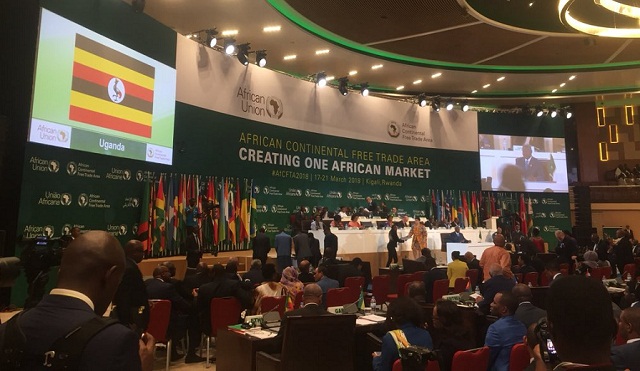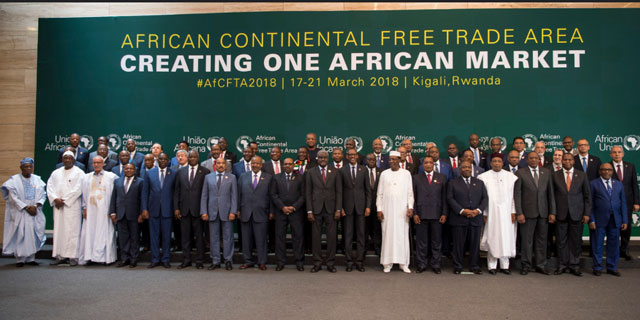
– ‘No room for the weak’ –
Proponents of the deal argue that African economies on their own are too small to support economic diversification and industrialisation on their own and will benefit from having a unified platform to negotiate trade deals with wealthier nations.
The “CFTA will make Africa one of the largest economies in the world and enhance its capacity to interact on equal terms with other international economic blocs,” said Faki in a speech before the signing ceremony.
“The world is changing, and changing at a great speed. International competition is fierce. It leaves no room for the weak.”
However, critics highlight a dearth of roads and other infrastructure linking different African nations, as well as the fact that many countries do not manufacture goods their neighbours may want to import, as challenges to the deal.
Sola Afolabi, a Nigeria-based international trade consultant, told AFP the fact already-existing regional trade blocs were not working, should be a red flag.
“If there is no reward for compliance and there is no punishment for non-compliance, then it is going to be a very nice agreement without any teeth or any legs,” he said.
– Breaking the trend –
Faki acknowledged that Africans “have seen so many proclamations remain a dead letter, so many commitments without practical execution that they have come to doubt the strength of our commitment.”
He urged for a break in this trend, calling for a deal that “must confound those who, outside Africa, continue to think — with barely-concealed condescension — that our decisions will never materialise.”
The CFTA is a key part of the AU’s long-term development plan Agenda 2063, which calls for easing trade and travel across the continent.
At its most recent summit in Ethiopia in January, AU member states agreed to a common air transport market that could drive down airfares, as well as plans for visa-free travel for Africans across the continent.
Also on Wednesday, 27 countries signed the protocol agreeing to the free movement of persons across the continent.

Countries and Signatories:
1.Niger – President Mahamadou Issoufou
2.Rwanda – President Paul Kagame
3.Tchad – President Idriss Deby
4.Angola – President Joao Lourenço
5.Central African Republic – President Faustin-Archange Touadéra
6. Comoros – President Azali Assoumani
7. The Republic of Congo – President Denis Sassou Nguesso
8. Djibouti – President Ismaïl Omar Guelleh
9. Ghana – President Nana Akufo-Addo
10. Gambia – President Adama Barrow
11. Gabon – President Ali Bongo Ondimba
12. Kenya – President Uhuru Kenyatta
13. Mozambique – Filipe Nyusi
14. Sahrawi Arab Democratic Republic – President Mohamed Abdelaziz
15. Senegal – President Macky Sall
16. South Africa – President Cyril Ramaphosa
17. Sudan – President Omar al-Bashir
18. Mauritania – President Mohamed Ould Abdel Aziz
19.Zimbabwe – President Emmerson Mnangagwa
20. Ivory Coast – Vice President Daniel Kablan Duncan
21.Seychelles –Vincent Meriton – Vice President
22. Algeria –Ahmed Ouyahia – Prime Minister
23.Equatorial Guinea – Francisco Pascual Obama Asue – Prime Minister
24.Lesotho – Tom Thabane – Prime Minister
25. Morocco – Saadeddine Othmani – Prime Minister
26. Swaziland – Barnabas Sibusiso Dlamini, Prime Minister
27. Tanzania – Kassim Majaliwa, Prime Minister
28.Tunisia – Youssef Chahed, Prime Minister
29.Benin – Aurélien Agbenonci, Minister for Foreign Affairs
30. Burkina Faso – Alpha Barry, Minister for Foreign Affairs
31. Democratic Republic of Congo – Leonard Okitundu, Minister for Foreign Affairs
32. Guinea – Mamadi Toure, Foreign Affairs Minister
33. Liberia – Gbehzohngar Findley, Foreign Affairs Minister
34.Mali – Minister for Foreign Affairs
35. Somalia – Minister for Foreign Affairs
36. South Sudan – Minister for Foreign Affairs
37. Uganda – Sam Kutesa, Minister for Foreign Affairs
38. Sao Tome and Principe – Cabinet Minister
39. Togo – Minister for Cooperation and Integration
40. Malawi – Emmanuel Fabiano, Foreign Affairs Minister
41. Cameroon – Finance Minister
42.Cape Verde –Tourism, Industry and Energy Minister
43. Libya – Mohamed Taha Siala, Minister of Foreign Affairs
44. Madagascar – Henry Rabary Njaka, Minister of Foreign Affairs
45. Zambia* – Joe Malanji, Minister of Foreign Affairs
46. Egypt – Tarek Kabil, Trade & Industry Minister
47. Mauritius – Vishnu Lutchmeenaraidoo, Foreign Affairs Minister
48. Ethiopia – Bekele Bulado, Trade Trade
49. Namibia – Minister of Industrialization
50. Botswana – Minister for Trade
Final tally:
1. #AfCFTA : 44 countries
2. Kigali Declaration: 43 countries
3. Protocol on Free Movement of People: 27 countries
 The Independent Uganda: You get the Truth we Pay the Price
The Independent Uganda: You get the Truth we Pay the Price





